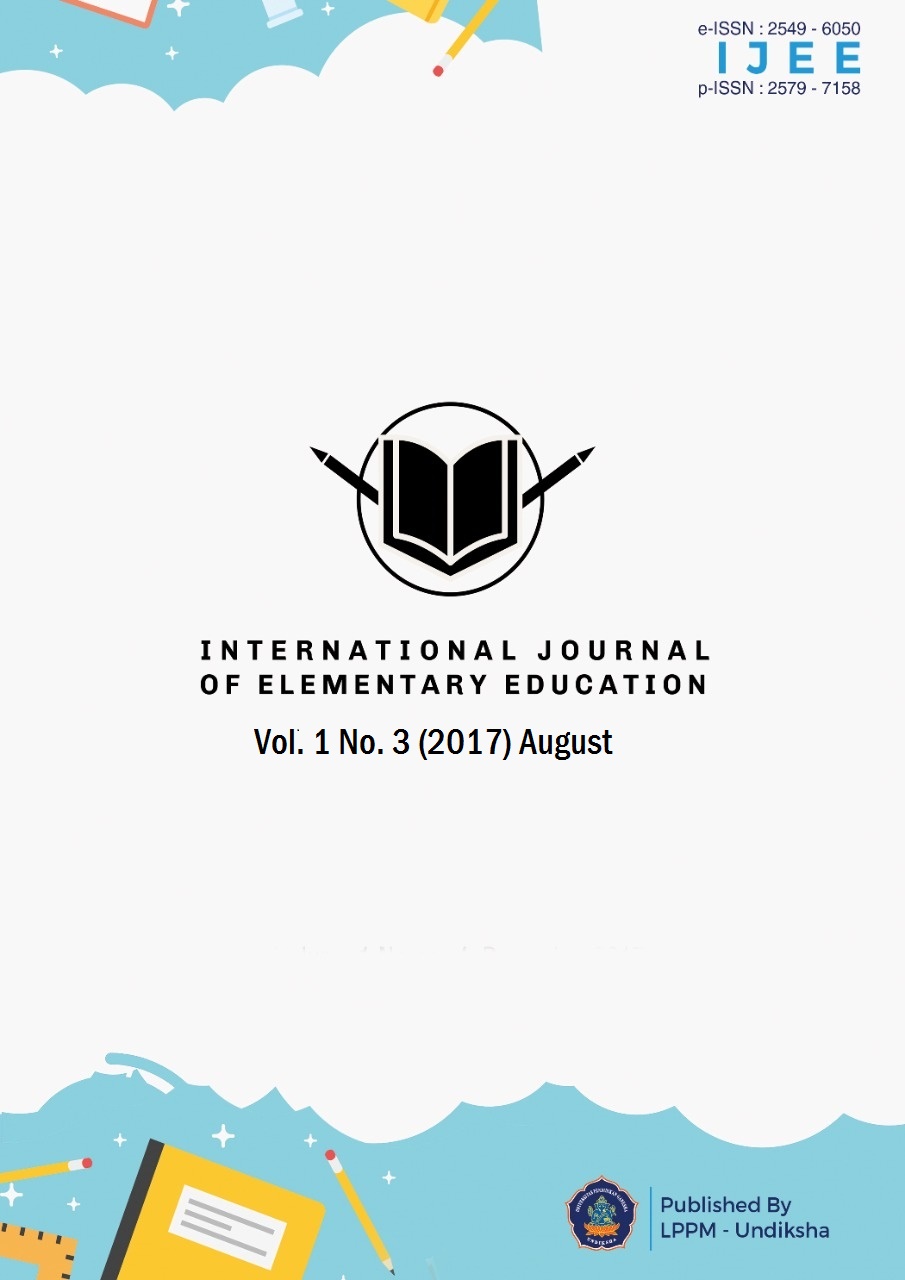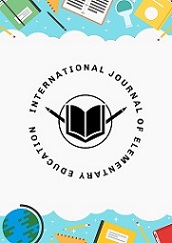PENGARUH PEMBELAJARAN QUANTUM BERBANTUAN PERMAINAN DALAM PEMBELAJARAN TERHADAP KEAKTIFAN DAN HASIL BELAJAR KOGNITIF IPA SISWA KELAS V
DOI:
https://doi.org/10.23887/ijee.v1i3.11888Abstrak
This research aims is to determine the differences of activity and learning outcomes of science between groups of students who were taught by learning Quantum assisted games and groups of students who were taught not with learning Quantum assisted game to elementary school students in V grade at Gugus II Santalia, Kubutambahan district, in academic year 2016/2017. This type of research is quasi experiment, with non equivalent design post test only control group design. The population in this study is the entire class V of elementary school in gugus II Santalia. The research sample in class V elementary school number 1 Kubutambahan as experimental group and class V elementary school number 7 Kubutambahan as control group obtained by random sampling technique by way of class lottery. Analytical methods that used in this study consist of descriptive analysis and inferential analysis using the t-test (polled variance). The results showed that there was a difference of activity and learning outcomes between the experimental group and the control group. The findings are that students become more active, enthusiastic, and happy during the learning process. In addition the steps of learning Quantum help students more easily understand the material. Thus the learning of Quantum-assisted games has an effect on the activity and learning outcomes of science students of grade V in Gugus II Santalia Kubutambahan distric of academic year 2016/2017Referensi
Alvionita, Vivi. 2013. “Pengaruh Penerapan Media Video Terhadap Aktivitas dan Penguasaan Materi Pokok Sistem Pernapasan”. Jurnal Bioterdidik, Volume 1, No 7 (hal 8). Diakses pada tanggal 20 Juni 2017.
Ambarjaya, Beni S. 2012. Psikologi Pendidikan & Pengajaran Teori & Praktik. Yogyakarta: CAPS.
Asrori, Sofiyah. 2014. “Penerapan Quantum Learning untuk Meningkatkan Aktivitas Belajar Siswa Pada Mata Pelajaran PKn di Kelas V SD Negeri Kembangjitengan 2 Kabupaten Sleman”. Kalam Cendekia PGSD Kebumen, Volume 3, No 1 (hal 6). Diakses pada tanggal 20 Juni 2017.
Darma, Putri. 2014. “Pengaruh Pembelajaran Biologi Melalui Metode Permainan dengan Media Kartu Kwartet Terhadap Keaktifan dan Hasil Belajar Siswa Kelas VII Smp Negeri 13 Kabupaten Jember Tahun Ajaran 2012/2013”. Pancaran Pendidikan, Volume 3, No 1 (hal 3-7). Diakses pada tanggal 20 Juni 2017.
Deporter, dkk. 2010. Quantum Teaching Mempraktikkan Quantum Learning di Ruang-ruang Kelas. Bandung: Kaifa.
Iwantara, I Wayan. 2014. “Pengaruh Penggunaan Media Video Youtube dalam Pembelajaran IPA Terhadap Motivasi Belajar dan Pemahaman Konsep Siswa”. Jurnal Pendidikan IPA, Volume 4, No 1 (hal 9). Diakses pada tanggal 20 Juni 2017.
Lisyaningrum, Nenie. 2015. “Upaya Meningkatkan Kualitas Pembelajaran Akuntansi Melalui Penerapan Strategi Pembelajaran Aktif Tipe Index Card Match dengan Teknik Penghargaan (Reward)”. Tata Arta, Volume 1, No 2 (hal 10). Diakses pada tanggal 20 Juni 2017.
Natalia. 2014. “Pengaruh Pemberian Penghargaan Oleh Guru Ekonomi Terhadap Motivasi Belajar Siswa Kelas X MAN 2 Pontianak”. Jurnal Pendidikan dan Pembelajaran, Volume 3, No 6 (hal 9). Diakses pada tanggal 20 Juni 2017.
Samatowa, Usman. 2016. Pembelajaran IPA di Sekolah Dasar. Jakarta: PT Indeks.
Suastra, I Wayan. 2009. Pembelajaran Sains Terkini Mendekatkan Siswa dengan Lingkungan Alamiah dan Sosial Budaya. Singaraja: Universitas Pendidikan Ganesha.
Sudono, Anggani. 2000. Sumber Belajar dan Alat Permainan (untuk Pendidikan Anak USia Dini). Jakarta: PT Gramedia.
Susanto, Ahmad. 2013. Teori Belajar dan Pembelajaran Di Sekolah Dasar. Jakarta: Prenadamedia Group.
Suwatra, dkk. 2015. Belajar dan Pembelajaran Sekolah Dasar. Singaraja: UNDIKSHA.
Suyadi. 2010. Psikologi Belajar Pendidikan Anak Usia Dini. Yogyakarta: PT Pustaka Insan Madani.
Syukur, Muhammad dkk. 2014. “Pengaruh Model Pembelajaran Quantum Teaching Terhadap Hasil Belajar Siswa SD”. Program Studi Pendidikan Dasar FKIP Universitas Tanjungpura (hal 10). Diakses pada tanggal 25 Januari 2017.
Vitasari, Rizka. 2016. “Peningkatan Keaktifan dan Hasil Belajar Matematika Melalui Model Problem Based Learning Siswa Kelas V SD Negeri 5 Kutosari”. Kalam Cendekia PGSD Kebumen, Volume 5, No 3 (hal 2). Diakses pada tanggal 18 Juni 2017.
Yamin, Martinis. 2007. Desain Pembelajaran Berbasis Tingkat Satuan Pendidikan. Jakarta: Gaung Persada Press.
Unduhan
Diterbitkan
Cara Mengutip
Terbitan
Bagian
Lisensi
Authors who publish with the International Journal of Elementary Education agree to the following terms:
- Authors retain copyright and grant the journal the right of first publication with the work simultaneously licensed under a Creative Commons Attribution License (CC BY-SA 4.0) that allows others to share the work with an acknowledgment of the work's authorship and initial publication in this journal.
- Authors are able to enter into separate, additional contractual arrangements for the non-exclusive distribution of the journal's published version of the work (e.g., post it to an institutional repository or publish it in a book), with an acknowledgment of its initial publication in this journal.
- Authors are permitted and encouraged to post their work online (e.g., in institutional repositories or on their website) prior to and during the submission process, as it can lead to productive exchanges, as well as earlier and greater citation of published work. (See The Effect of Open Access)










